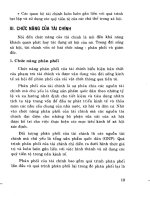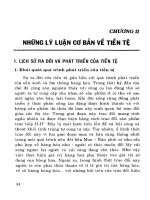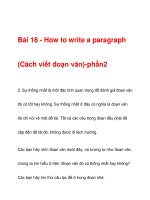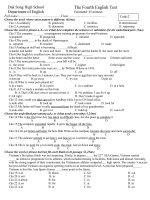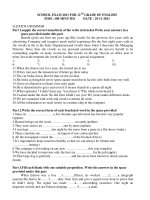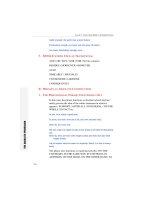Textbooks write English correctly_05 ppsx
Bạn đang xem bản rút gọn của tài liệu. Xem và tải ngay bản đầy đủ của tài liệu tại đây (139.04 KB, 24 trang )
lesson 5 - The Phrases
-105-
THE INFINITIVE PHRASE
V ALLOW; ASK; GIVE; TEACH; TELL
[P3]
Bao thăng ₫o ₫ưng vac măt ₫ḯn ₫êy nưa.
Tell that boy not to come here again!
Me a, day cho con lam thḯ nao ₫ï̉ chiï̀u möt ngươi ₫an öng.
Mother, show me how to please a man.
Cha me luön day chung töi ₫ưng kiḯm sö́ng băng lương gat.
Our parents always teach us not to make a living by fraud.
Cö ta yïu cều töi giư bñ mêt vï̀ chuyïn nay.
She asked me to keep this a secret.
Cö ta bao töi ₫ưng chơ anh.
She told me not to wait for you.
[P4]
Töi thếy bươc vao möt căn phong ₫ềy ngươi la möt cưc hònh.
I find it an ordeal to walk into a room full of people.
Töi cho co cha me dï̃ thương la ₫iï̀u ₫ai hanh.
I think it a blessing to have nice parents.
Töi cho răng sö́ng ơ möt thị trến nho la möt ₫iï̀u phñ hoai.
I think it a waste to live in a small town.
Töi thếy bo möt thoi quen xếu rết kho.
I find it very hard to give up a bad habit.
Chung töi tết ca ₫ï̀u cho viïc chḯt cho ly tương cöng san la möt vinh
dư.
We all believe it an honor to die for communist cause.
(c) As an SC
Ươc muö́n cuö́i cung cua bö́ töi la ₫ươc chön cết bïn canh me töi.
My father’s last wish is to be buried by my mother.
ASK SB (NOT) TO DO ST
lesson 5 - The Phrases
-106-
THE INFINITIVE PHRASE
Y ₫ịnh cua töi la ₫ươc tiḯp tuc viïc hoc ơ nươc ngoai.
My intention is to continue my studies abroad.
Quyḯt ₫ịnh cua chung töi la chơ chỉ dễn tiḯp theo.
Our decision is to wait for further instructions.
Hoai bao hiïn giơ cua hăn la trơ thanh möt nha văn nö̉i tiḯng.
His dream/vision at present is to become a well known writer.
Hoai bao cua ₫ưa con trai ut ho la trơ thanh möt phi hanh gia.
Their youngest son’s dream is to become an astronaut.
Kḯ hoach cua chung töi la chơ ₫ḯn tuền sau.
Our plan is to wait until next week.
Kḯ hoach cua töi la chơ ho ₫ḯn sau tḯt.
Our plan is to wait for them until after Tet.
Mö
t thết bai thöng thương la hanh ₫öng thiḯu suy nghĩ.
A common failing is to act without thinking.
(d) As an Object of a Preposition
Töi khöng con cach nao khac la cươi trư ma thöi.
I had no choice but to laugh away.
I could not choose but laugh it away.
Luc ₫o hăn khöng con lưa chon nao khac ngoai tư chưc.
He then had no choice but to resign.
He could not choose but resign.
Chung töi khöng lam gò khac ngoai tro chuyïn ra.
We did nothing but talk to each other.
HAVE NO CHOICE BUT TO DO ST
CAN DO NOTHING BUT DO ST
CAN NOT CHOOSE BUT DO ST
lesson 5 - The Phrases
-107-
THE INFINITIVE PHRASE
BUT TO DO ST is a prepositional phrase func-
tions as an adjective which modifies such nouns
as: CHOICE, OPTION , ALTERNATIVE etc.
Honey, I don’t know why. But I prefer to dine out rather than
stay home tonight.
Höm nay töi thñch ơ nha chư khöng muö́n ₫i xem xi nï.
I prefer to stay home rather than go to the cinema tonight.
Chung töi lam moi biïn phap ngoai trư dung vu lưc.
We have done any measure except use force.
(e) As an Appositive
Tư trươc giơ no chỉ co möt muc ₫ñch trong ₫ơi: lam cang nhiï̀u tiï̀n
cang tö́t.
He has had only one objective in life: to make as much money
as possible.
Y ₫ịnh cua chung töi khiḯn ho trơ lai lam ban ₫a thết bai.
Our intention, to make them friends again, has been misunder-
stood/failed.
Kḯ hoach cua chñnh phu, xêy dưng möt ₫ương hềm qua söng giưa
Saigon va Thu Thiïm, hònh như găp nhiï̀u chö́ng ₫ö́i.
The plan of the city government, to build a tunnel between SG
and Thu Thiem, seems to have met with a lot of opposition.
Töi ₫a thết bai trong viïc thưc hiïn hoai bao duy nhết cua mònh: trơ
thanh nha văn chuyïn nghiï
p.
I’ve failed to achieve my only ambition in life: to become a pro-
fessional writer.
PREFER TO DO ST RATHER THAN DO ST ELSE
TO DO ANYTHING EXCEPT DO ST ELSE
AIM/OBJECTIVE/PLAN/INTENTION , IP
lesson 5 - The Phrases
-108-
THE INFINITIVE PHRASE
Töi biḯt töi ₫ang lam gò; töi khöng cền ₫ươc bao phai lam gò.
I know what I’m doing; I don’t need to be told what to do.
Chung töi ₫ươc day dö̃ khöng bao giơ ăn căp thư gò cua ai.
We are often taught to earn our living by working hard.
Chung töi ₫ươc chỉ cach vên hanh chiḯc may nay.
We were shown how to operate this machine.
Cö ta ₫ươc yïu cều hat bai hat.
She was asked to start/begin the song.
b. The Use of IP as an Adjective
(a) As the Modifier of a Noun
Möt ban gai ₫ï̉ ₫i chơi khöng phai la möt cö gai ₫ï̉ cươi.
A girl to go out with is not a girl to marry.
Tònh yïu la thư khöng thï̉ ₫ua giơn.
Love is something not to toy with.
Đêy khöng phai nơi ₫ï̉ sö́ng.
This is not a place to live in.
Töi khöng co gò ₫ï̉ noi.
I have nothing to say.
Töi cền phai mua săm trươc khi ₫i.
I have some shopping to do before I leave.
Töi co vai viïc phai giai quyḯt trươc khi ₫i.
I have a few things to settle before I leave.
TO TELL SB
TO ASK SB
TO TEACH SB
TO SHOW SB
TO ALLOW SB
(NOT/NEVER) TO DO ST (AGAIN)
WHAT TO DO / HOW TO DO ST
ST / TO DO ST
lesson 5 - The Phrases
-109-
THE INFINITIVE PHRASE
Chung ta phai cö́ găng lam thḯ giơi nay tö́t hơn ₫ï̉ ma sö́ng.
We must try to make this world a better place to live in.
Cuöc ₫ơi la möt dong söng khöng phai ₫ï̉ ngăm nhòn, ma ₫ï̉ bơi löi
trong ₫o.
Life is a river not to watch, but to swim in.
Nhưng thư ₫ang ₫ươc tranh ₫ếu ₫ï̉ danh lếy thò phai ₫ang.
Things to fight for worth fighting for.
Co möt thơi ₫ï̉ yïu va co möt thơi ₫ï̉ nhơ.
There are times to love and there are times to remember.
Em phai ₫anh may 3 bư
c thư nưa.
I’ve got 3 more letters to type.
Răng cai chuyïn anh lưa töi ₫a ro như ban ngay, anh con gò ₫ï̉ noi
khöng.
That you cheated me is as broad as daylight, have you got any-
thing else to say?
Ngay mai anh co lam gò khöng?
Have you got something to do tomorrow?
Khöng cền bên têm vï̀ chuyïn ₫o.
There is no need to worry about that.
Vến ₫ï̀ ₫a ₫ươc ban cai khöng liïn quan gò ₫ḯn anh.
The issue discussed has nothing to do with you.
Vến ₫ï̀ ₫ang ₫ươc ban cai khöng liïn quan gò ₫ḯn anh.
The issue under discussion has nothing to do with you.
Vến ₫ï̀ se ₫ươc ban cai khöng liïn quan gò ₫ḯn anh.
The issue to be discussed has nothing to do with you.
Anh ta ₫i ngu ma khöng co gò pha
i bên têm.
He went to bed without anything to worry.
(b) As the Modifier of a SC [P3 & P10]
lesson 5 - The Phrases
-110-
THE INFINITIVE PHRASE
V SEE, HEAR, WATCH, MAKE
Töi thếy ₫ưa be nay vao cưa tiïm nay 3 lền höm nay.
I’ve seen this boy entered this shop 3 times today.
Ngươi ta thếy ₫ưa be nay vao cưa tiïm nay 3 lền höm nay.
This boy was seen to enter this shop 3 times today.
Ngươi ta thếy khoi bö́c lïn tư phña sau tram xăng.
Smoke was seen to rise from behind the gas station.
Hăn ta bị ngươi ta thếy ₫ang ăn căp tui cua töi.
He was seen to stealing my purse.
Ngươi ta nghe anh phan nan rết nhiï̀u vï̀ töi. Anh phan vï̀ töi
chuyïn gò?
You have been heard to complain about me. What do you want
to complain about at all?
Ngươi ta nghe hăn dñnh dang tơi vu xò căng ₫an.
He was heard to involve in the scandal.
Albert Einstein ₫ươc chon la nhên vêt cua thḯ ky 20.
Albert Einstein was chosen to be the person of 20
th
century.
Cö ta hònh như ₫a thay ₫ö̉i y ₫ịnh cua mònh.
She seems to have changed her mind.
TO SEE SOMEBODY DO ST / DOING ST
SB [BE] SEEN TO DO ST / DOING ST
* TO INFI refers to the completion of the action
* INFI w/o TO refers to the continuity of the action
TO BE TO DO ST
lesson 5 - The Phrases
-111-
THE INFINITIVE PHRASE
This construction shows an arrangement or a hope in the future.
You are to be interviewed from 9:00 to 9:30 tomorrow.
Töi phai găp öng giam ₫ö́c luc 10 giơ sang mai.
I am to see my Manager about 10:00 am tomorrow.
The next flight to Hongkong is to take off at 10:55.
You are to be transferred to another department.
(c) As the Modifier of an OC [P4]
Lao chu băt chung töi lam viïc vö cung cưc nhoc.
The boss makes us work very hard.
Töi thếy anh ta rết dï̃ băt chuyïn.
I found him quite easy to talk to.
Töi nghĩ hoc săn săng hơp tac vơi chung ta.
I think them quite ready to cooperate with us.
Töi thếy tònh thḯ rết kho ₫ö́i pho.
We found the situation hard to cope with.
c. The Use of IP as an Adverb
(a) As the Modifier of an ADJECTIVE
In this case, the IP usually functions as the ADVERB OF PUR-
POSE.
A person anxious to achieve his or her purpose is likely to use any
mean, fair or foul.
Möt ngươi săn sang thết bai se dï̃ dang thanh cöng.
A person willing to lose is likely to win
Nhưng thư dï̃ ₫ḯn ₫ï̀u ₫ï̃ ₫i.
Things easy to come are easy to go.
ADJECTIVE IP (= adverbial expression)
lesson 5 - The Phrases
-112-
THE INFINITIVE PHRASE
Cưng a me anh kho tñnh qua.
Honey, your mother is hard to please.
Vến ₫ï̀ nay kho giai quyḯt qua.
This problem is hard to solve.
Möt ngươi co thï̉ vươt lïn chñnh mònh se co thï̉ vươt lïn trïn ngươi
khac.
A person able to rise above himself is able to rise above the
others.
Möt ke khöng thï̉ tï̀ gia thò khöng thï̉ trị quö́c.
A person unable to run his family is unable to run his country
Ai cung ₫au buö̀n khi thếy thơi thanh xuên cua mònh ra ₫i.
Everybody is unhappy to see his youth going away.
Long tö́t thưc sư thơi nay rết kho kiḯm.
True kindness of hear is hard to find these days.
Em băng long sö́ng vơi anh va chăm soc anh cho ₫ḯn khi anh qua
₫ơi.
I’m content to live with and take care of you until you die.
Langdon cam thếy ngươi chu nha nay khöng phai la ke
dï̃ dai.
Langdon sensed his host was a hard man to please.
(D.Brown, The Davinci Code)
(b) As the Modifier of a VERB, or rather a PREDICATE
As the modifier of the Predicate, the IP usually functions as an
ADVERB of PURPOSE.
PREDICATE IP (= adverbial expression)
lesson 5 - The Phrases
-113-
THE INFINITIVE PHRASE
Hăn co ve như ₫ang buöng tröi moi viïc.
He seems to let things go.
Cö ta co ve như ₫a hiï̉u lềm sư quan têm cua töi
She seemed to have mistaken my attention
Co ve như töi ₫a ₫ăt sai tònh yïu thương cua mònh.
I seemed to have misplaced my affection.
Hăn lếy cö ta ₫ï̉ lam vui long ba me hăn.
He married her to please his mother.
Ho phai ban nha ₫ï̉ tra nơ.
They had to sell their house to pay their debt.
Töi phai ₫ö̉i viïc ₫ï̉ lam vui long ba ma töi.
I had to change my job to please my parents
Chung ta phai hoc tö́t vơi chñnh mònh ₫ï̉ tö́t vơi ngươi khac.
We must learn to be kind to ourselves in order to be really kind
to others.
Chung ta phai ca
i tiḯn ca ky thuêt lễn thiḯt kḯ san phểm ₫ï̉ ban
chay hơn.
We must improve both the quality and the design of our prod-
ucts to sell them well.
Töi ₫a phai lam viïc vết va ₫ï̉ kiḯm sö́ng.
I have been working very hard to earn my living.
Đï̉ ban chay hơn, chung töi phai ha gia xuö́ng.
* The expression ‘IN ORDER TO DO ST’ is used when
emphasis is given to the ADVERB OF PURPOSE.
When both the purpose and result of the purpose is
emphasized, the expresion ‘SO AS TO DO ST’ or ‘SO
AS NOT TO DO ST’ is used; in other words, ‘NOT TO
DO ST’ is used when it functions as an adjective or as a
noun. When the sentence is long, the IP of purpose
occupies initial position.
lesson 5 - The Phrases
-114-
THE INFINITIVE PHRASE
To sell them well, we must try to lower our prices.
Đï̉ sö́ng hanh phuc, ngươi ta phai hiï̉u mònh la ai va mònh muö́n gò.
To live happily, one must understand that one really is and
what one really wishes for.
Cuö́i cung hăn cung ₫a co tiï̀n, quyï̀n lưc va danh tiḯng chỉ ₫ï̉ thếy
gia ₫ònh tan nat.
He finally achieve money, power and fame to find his family
shattered.
Ba muö́n sö́ng ₫ï̉ nhòn thếy cac con thanh gia thết va ö̉ng ₫ịnh trươc
khi ba nhăm măt.
I will live to see you married and settled before I die.
(c) As the Modifier of an ADVERB
I don’t love her enough to marry her.
She has been working hard enough to be given a rise.
Don’t worry too much about her. She is old enough to take care of
herself / to decide for her self / to stand on her own feet.
She is experienced enough to deal with this situation.
She is too young to decide for herself.
I am too old to marry again.
The distance is too far to walk.
Honey, your mother is too difficult to please.
The IP is sometimes used as an ADVERB of
RESULT, especially with the use of the infinitives
SEE or FIND.
TOO / ENOUGH IP
TOO + ADV / ADJ / UN’s / CN’s + IP
lesson 5 - The Phrases
-115-
THE PARTICIPLE PHRASE
He left too quickly to obtain a clear view of the situation.
He is too young to be entrusted with the post.
We are too tired to go any further.
Your mistake is too obvious to overlook.
We were not close enough to identify them.
I think I don’t love her enough to suffer.
d. The Use of IP as ABSOLUTE
In this case, the IP functions as an absolute expression and has
no grammatical function in the statement in which it appears. In
other words, it does not modify any word at all. Instead, it gov-
erns the whole idea or statement, and normally expresses the
speaker’s or the writer’s attitude towards what is being spoken
or what is being written and usually occupies the initial posi-
tion. Sometimes, it occupies in middle position, normally after
the subject of the sentence. TO BE HONEST, TO BE FAIR, TO
BE FRANK, TO BE SURE, TO TELL THE TRUTH, TO SUM
UP, TO SAY THE LEAST etc.
To be frank, I don’t like your boyfriend at all; he’s a bit talkative.
He has been, to be fair, of great help to us.
To sum up, she doesn’t love me enough for me to marry her.
My house, to be sure, can not compare with yours.
Life, to be fair, neither mean to any one nor kind to any one.
III. THE PARTICIPLE PHRASE
A. THE PARTICIPLE
1. WHAT IS A PARTICIPLE?
The Participle is a verb form that may be used as an adjective to
modify a noun, a pronoun or a noun equivalent. There are two
lesson 5 - The Phrases
-116-
THE PARTICIPLE PHRASE
forms of the participle: the present participle and the past parti-
ciple.
The Present Participle is formed by adding ING to a verb.
BE BEING
DO DOING
The Past Participle is formed in various ways:
STUDY STUDIED
HEAR HEARD
FEEL FELT
KNOW KNOWN
GROW GROWN
The Perfect Participle
HAVING DONE
HAVING TALKED TO SOMEBODY
HAVING BEEN THERE SEVERAL TIMES
HAVING BEEN DECIDED BY SOMEBODY
2. WHAT IS THE USE OF PARTICIPLE?
The participle is used as an adjective. Many present participles
and past participles are used as attributive adjectives or apposi-
tive adjectives. Only a number of them can be used as predica-
tive adjectives.
As an adjective, the present participle is normally active in
meaning and the past participle is passive in meaning.
a. The Use of the Participle as an Attributive Adjective
In this case, the participle normally comes before the noun it
modifies.
lesson 5 - The Phrases
-117-
THE PARTICIPLE PHRASE
PRESENT PARTICIPLE
Chung ta la möt nươc ₫ang phat triï̉n.
We are a developing country.
Cho sua thò khöng căn.
Barking dogs wont bite.
Nha nươc ₫ang cö́ găng tòm ra giai phap ₫ï̉ xư ly sư cach biït ngay
cang lơn giưa ngươi giau va ngheo.
The government is trying to find a solution/measure to cope with
the widening gap between the rich and the poor.
Nan thết nghiïp co thï̉ la nguyïn nhên cua tònh trang töi pham gia
tăng.
Unemployment may be an underlying cause of the rising crime rate.
Cö ta co möt nu cươi lam say ₫ăm long ngươi.
She has a charming/winning smile.
Đêy la möt trong nhưng cuö́n sach hay nhết vï̀ ₫ï̀ tai nay.
This is one of the most interesting book on this subject.
Thơi trang ₫ang thay
₫ö̉i vơi tö́c ₫ö chong măt.
Fashion are changing with bewildering/confusing rapidity.
Nang nem cho töi möt cai nhòn cö̉ vu.
She gave me an encouraging/discouraging look.
Nươc chay thò bao giơ cung trong.
Running water is always clear.
Trong ngươi töi như co lưa thiïu ₫ö́t.
It was like a burning fire in my bone.
Chu nhêt tơi la sinh nhêt cua cö ếy.
This coming Sunday is her birthday.
PAST PARTICIPLE
Sö́ du khach bị băt coc ₫a ₫ươc tra tư do ngay höm qua.
The kidnapped tourists were set free yesterday.
Chung ta phai cö́ găng ₫ï̉ bu vao thơi gian ₫a mết.
We must try to make up for the lost time.
lesson 5 - The Phrases
-118-
THE PARTICIPLE PHRASE
Thơi gian bu thïm la 2 phut.
The added time is 2 minutes.
Thơi gian cho phep la 2 giơ.
The time allowed is half an hour.
The allowed time…
Cö ta hònh như ₫ang cö́ găng băt lai thơi tuö̉i tre ₫a mết ₫i.
She seems to be trying to recapture her lost youth.
Thưc sư chung ta ₫ang ₫anh möt trên ma chung ta ₫a thua.
In fact, we are fighting a lost fight.
Dư an nay nhăm giup ₫ơ nhưng gia ₫ònh co thu nhêp thếp.
This project is intended to help families with limited incomes.
Nḯu nhưng giếc mơ chḯt ₫i thò cuöc ₫ơi se chỉ la nhưng con chim co
₫öi canh gay.
If dreams die, life is only a bird with broken wings.
Töi thê
́y mònh ₫ang lang thang trïn bai biï̉n ₫a văng ngươi.
I found myself wandering about on the almost deserted beach.
Chung töi găp nhau ₫ung giơ ₫a ₫ịnh.
We met at the appointed time.
Đêy la gia trị ₫uơc nhiï̀u ngươi ưa thñch.
This is what to be valued.
Sư tö́t bung thưc sư khöng con la möt gia trị ma ngươi ta ưa thñch
nưa.
True kindness of heart seems no longer to be valued.
Quyï̀n lơi cua giai cếp thö́ng trị va giai cếp bị thö́ng trị luön xung
khăc nhau. Va ₫êy la möt chên ly.
The interest of the governing class and the governed class are
always in a conflict. And this is a truth.
Nhưng ngươ
i bị thương bị bo chay mau cho ₫ḯn chḯt.
The wounded people were left bleeding to death.
Trïn gương măt ba me co ve tuyït vong.
There was a disappointed look on his mothers face.
Chị la möt ₫ưa con ₫ươc bö́ me thương yïu: con muö́n gò nưa.
lesson 5 - The Phrases
-119-
THE PARTICIPLE PHRASE
You are a loved daughter: what else do you want.
Ve be bang hiïn ra trïn gương măt gềy go cua hăn.
A humiliated look came over his bony face.
GERUND
A fishing village
Trading Center
Dining room.
Meeting room
But
PARTICIPLE
The rising sun
the sun that is rising (participle)
Cai hö̀ la möt tuyït tac trong buö̉i chiï̀u ta.
The lake was a vision in the setting sun.
PARTICIPLE
The waiting bus is about 100 km away.
The bus that is waiting
We are waiting for the bus.
(progressive tense)
GERUND
The waiting room is about 300m2 in area.
Don’t ever mistake a present participle for a gerund
which also functions as an adjective. A gerund
normally refers to the use or activity of the thing
indicated by the noun it modifies.
1
The Present Participle is also used for forming pro-
gressive tense.
2
lesson 5 - The Phrases
-120-
THE PARTICIPLE PHRASE
Simple Past Tense
I lost my heart to San Francisco.
Present Perfect Tense
You have fallen for her.
b. As a Predicative Adjective
SC Present Participle or Past Participle
Đơi sö́ng ơ tỉnh nho thêt la buö̀n chan.
Life in a small town is normally boring.
Thònh lònh, khöng khñ trong gia ₫ònh trơ nïn ngöt ngat.
Suddenly, the atmosphere in the family came suffocating/stiffing.
Kḯt qua bều cư rết phến khơi.
The results of the election are quite delighting.
Khöng khñ biï̉n thương sang khoai.
The sea air is normally refreshing.
Sư thanh cöng cua ₫öi chung ta rết ₫ang ngac nhiïn.
The success of our teams is surprising.
Sư thết bai cua chung ta thêt ₫ang xếu hö̉.
Our defeat is quite humiliating.
Tin tưc lam ngươi ta nan chñ.
The news is quite discouraging/ disheartening.
Past participle = ADJ=SC
Sao tröng anh chan nan thḯ?
Why do you look so bored?
The Past Participle is also used to form various
verb tenses.
3
P: V SC
M
M
s
lesson 5 - The Phrases
-121-
THE PARTICIPLE PHRASE
Cö ta rết bưc mònh vò khöng ₫ươc chon.
She was very disappointed not to have been chosen.
Cö ta cam thếy bị tö̉n thương vò khöng ₫ươc mơi.
She felt hurted not have been invited.
Töi ₫a chan ngếy lö́i sö́ng nay rö̀i.
I’m bored to death with this way of living.
Nhưng ngay thang ma ta hanh phuc bïn nhau nay khöng con nưa.
The days we enjoyed being together are now gone.
Xḯp tröng rết bưc mònh.
The boss looks very annoyed.
Giếc mơ cua hăn tan tanh.
His dream was shattered.
c. As an OC
OC Present Participle or Past Participle
Töi thếy ban trai cua chị ₫ang chan.
To be frank, I find your boyfriend so boring.
Nhiï̀u ngươi nghĩ cuöc sö́ng ơ xư sơ nay ₫ang chan.
Many people think life in this country very boring.
Sau cung hăn thếy moi hy vong ₫ï̀u tan biḯn mết.
Finally, he found his hopes gone.
Sau cung hăn nhên thếy moi niï̀m tin cua nang ₫ăt nơi hăn ₫a tan
biḯn.
Finally, he found her faith in him gone.
Möt ngay nao ₫o chị se thếy mònh bị vơ möng.
Some day you will find yourself disillusioned.
Pattern 4A
S
P: V O OC
M
M
P4
lesson 5 - The Phrases
-122-
THE PARTICIPLE PHRASE
Töi nghĩ ngay nao cung lam möt thư chuyïn thò chan chḯt.
I think it boring to do the same thing dayafter day.
Töi nghĩ sö́ng möt cuöc sö́ng ₫a dang thêt thu vị.
I think it interesting to live a life full of variety.
Töi thếy sö́ng möt cuöc sö́ng khöng muc ₫ñch thò ₫ang xếu hö̉.
I think it humiliating to live a life without purpose.
NOTE There are only a number of verbs the present participle and the
past participle of which can be used both attributively and pred-
icatively such as: AMAZE, ANNOY, ASTONISH, DELIGHT,
DISAPPOINT, DISCOURAGE, DISHEARTEN, DISTURB,
BEWITCH, BORE, ENCHARM, ENCOURAGE, EXCITE,
FASCINATE, FRIGHTEN, HORRIFY, HUMILIATE, INVIG-
ORATE, INVITE, IRRIITATE, INTEREST, PLEASE, PUZ-
ZLE, REFRESH, STIFFLE,SUFFOCATE, SURPRISE,
TERRIFY.
Many participles are made adverbs by adding ‘LY’ to them.
Remember that they are active in meaning.
Lơi ₫ï̀ nghị cua ho thêt hếp dễn.
Their offer is very inviting.
Khöng khñ buö̉i sang thương mat me möt cach ₫ềy sang khoai.
The morning air is normally refreshingly cool.
Thoat ₫ều ban co thï̉ thếy cuöc sö́ng nơi ₫êy mơi la möt cach ₫ềy
hếp dễn; nhưng sau möt thơi gian ban se thếy no buö̀n chan như
moi nơi khac.
At first, you may find life here fascinating novel; but afterwards you
may find it as boring as any where else.
Khoa hoc ky thuêt ₫a co nhưng tiḯn bö vươt bưc trong thḯ ky 20.
The Science and Technology made amazingly quick progress in the
20th century.
S
M
P: V IT OC
trueO
M
lesson 5 - The Phrases
-123-
THE PARTICIPLE PHRASE
Nươc trong hö̀ tröng mat me möt cach ₫ềy mơi moc.
The water in the lake looks so invitingly cool.
Đöi möi nang ₫o mong möt cach ₫ềy mơi moc.
Her lips are invitingly rose.
d. As an Appositive Adjective
In this case, the participle only gives more information to the
word it refers to. In other words, it is non-defining and must be
set off. It usually gives more information to the Subject of the
sentence.
(a) The Subject of a Sentence is a Noun
In this case, the participle may follow or precede the subject on
the following conditions:
1. There must be at least two single participles combined
together.
2. or a single participle must be modified by an adver-
bial phrase or clause.
Initial Position
Thanh thêt va tö́t bung, bö́ töi co möt sö́ ban tö́t trong ₫ơi.
Honest and kindhearted, my father had a few good friends in life.
Đươc cö̉ vu bơi thềy giao cua no, Bob ₫a mau chong ₫at ₫ươc ₫iï̉m
tö́t.
Encouraged by his teacher, Bob soon made good grades.
Bị vươt tröi vï̀ cach chơi, ₫öi cua chung ta thua ₫êm.
Outweighted and outplayed, our team lost a big score.
Tềm voc thếp va khoe manh, Jacob la möt ngươi hương nöi, toan bö
têm hö̀n anh ta ₫ươc cö́ng hiḯn cho viïc nghiïn cưu sach vơ.
Short and sturdy, Jacob was by temperament an introvert, his whole
ADJECTIVE + ADVERBIAL EXRESSION
ADJECTIVE 1 + ADJECTIVE 2
lesson 5 - The Phrases
-124-
THE PARTICIPLE PHRASE
being dedicated to bookish research.
Middle position
Bö́ töi, thanh thêt va tö́t bung, co möt sö́ ban tö́t trong ₫ơi.
My father, honest and kindhearted, had a few good friends in life.
Bob, ₫ươc cö̉ vu bơi giao viïn cua no, ₫a mau chong ₫at ₫ươc ₫iï̉m
tö́t.
Bob, encouraged by his teacher, soon made good grades.
Jacob, tềm voc thếp va khoe manh, la möt ngươi hương nöi, toan bö
têm hö̀n anh ₫ươc cö́ng hiḯn vao viïc nghiïn cưu sach vơ.
Jacob, short and sturdy, was an introvert by temperament, his whole
being dedicated to bookish research.
Chiḯc ao khoac, bac mau va ta tơi , la vêt sơ hưu duy nhết cua ga.
The coat, faded and torn, was his only possesion.
(b) The Subject of a Sentence is a Pronoun
In this case, the combined or single participle modified by an
adverbial phrase or clause always comes before the subject of
the sentence.
Encouraged by his teacher, he, soon made good grades.
B. THE PARTICIPLE PHRASE
1. WHAT IS A PARTICIPLE PHRASE?
A participle phrase is a syntactic unit which consists of a parti-
ciple and any compliment(s) or modifier(s) it may take. A parti-
ciple phrase always functions as an adjective. In other words, a
participle phrase, like a single adjective, can be defining or non-
defining.
ADJECTIVE + adverbial exression
ADJECTIVE 1 + ADJECTIVE 2
S = N ,
lesson 5 - The Phrases
-125-
THE PARTICIPLE PHRASE
C. WHAT ARE THE MOST COMMON PARTICIPLE PHRASE?
The boy standing by the window is her new boyfriend.
(pp= attributive adjective, present, active)
The question being discussed has nothing to do with you.
(pp= attributive adjective, present, passive)
Having looked carefully in every direction, the old woman ventured
to cross the street.
(pp= appositive adjective, present perfect, active)
Having been warned, the man was sent on the journey.
(pp= appositive adjective, present perfect, active)
1. WHAT ARE THE USES OF THE PARTICIPLE PHRASE?
a. The Use of the Participle Phrase as a Defining Adjective
(Attributive Adjective)
In this case, a participle phrase always follows the noun or pro-
noun it modifies and must not be set off. In other words, if the
phrase is removed, the meaning of the noun or pronoun it modi-
fies will be destroyed.
Besides, it should be remembered that when the phrase is
present participle, the action expressed by it is at the same time
as or immediately
before or after the action expressed by the
governing verbs. And when the phrase is past participle, the
THE PARTICIPLE PHRASE
Active
Passive
Perfect
PresentPerfect
Present
doing
reading
Having read
Having done
Being done
Being read Having been read
Having been done
lesson 5 - The Phrases
-126-
THE PARTICIPLE PHRASE
action expressed by it is always completed before the action
expressed by the governing verb.
Töi thếy ₫ưa be ₫ang ₫ưng ơ cö̉ng khi töi vï̀.
I saw the child standing at the gate when I left.
Cuö́n sach cua hăn ₫ï̀ cêp tơi möt sö́ vến ₫ï̀ lơn ma chñnh phu hiïn
₫ang phai ₫ö́i ₫ều.
His book covers a number of major problems facing our government
at present.
Bết ky ₫öi bong nao thua trong bết ky vong nao trư vong chung kḯt
se phai vï̀ nươc trong vong 24 tiḯng.
b. The Use of the Participle Phrase as Non-Defining Adjective
(Appositive Adjective)
In this case, a participle phrase only gives more information to
the noun or pronoun it refers to. The phrase must be set off. In
other words, it may be omitted without any destruction to the
grammar/syntax of the sentence in which it appears.
When the phrase refers to the subject of a sentence, it may
occupy different positions depend on the subject is a noun a or a
pronoun and depend on the logic of each situation.
2. HOW TO MAKE THE PHRASE NEGATIVE?
A participle phrase is made negative by using NOT infront.
Pay attention to the following construction.
Sunlight came streaming through the window.
the rest of the sentence.
PP, S
+
the rest of the sentence.
S, PP
,
the rest of the sentence
, PP.
S
+
lesson 5 - The Phrases
-127-
THE PARTICIPLE PHRASE
Khöng nhên thếy Alice ₫a nö̉i giên, chang trai tiḯp tuc leo ₫eo theo
sau nang trïn phö́.
Not realizing how angry Alice was becoming, the young man contin-
ued following her along in the street.
Chưa ₫oc cuö́n sach ma anh ₫ang noi tơi, töi sơ mònh khöng thï̉ ₫ưa
ra y kiḯn nao ca.
Not having read the book you are talking about, I’m afraid that I’m
unable to give any opinion about it.
Chưa nhòn ky moi hương, ba gia ₫a băng qua ₫ương.
Not having looked every direction, the old lady ventured to cross the
street.
The boy standing at the gate is my son.
(attributive)
Living in Saigon, we must sometimes miss a vast expanse of open
country.
(appositive)
The gentleman looking out at the windows is his father.
NOT
+
participle phrase
The PP always functions as an adjective. It may be
defining (attritbutive) or non-defining (appositive).
When functions as an attributive adjective, it defies or
limits the noun it refers to; when it functions as
appositive adjective, it only gives more information to
the noun it refers to.
1
Attributive PP must follow the noun or the pronoun
they modified or qualified, and they must not be set
off.
2
lesson 5 - The Phrases
-128-
THE PARTICIPLE PHRASE
(attributive)
The girl talking with Mary is John’s new girl friend.
(attributive)
Nala, talking with my mother, is John’s friend.
(appositive)
3. THE DIFFERENT USES OF THE PP
a. The Use of PP as SC
The children come running into the house.
The dog came running to meet me.
Sunlight came streaming through the window.
When the phrase functions as an appositive modifier, it may
have different positions:
(a) Subject is a Noun
Depend on the context, there are three positions as below:
(i) The Initial Position
Standing at the corner of the street, the detective watches the
woman moving in her bed room.
(ii) The Middle Position
Appositive PP may occupy different positions, depend-
ing on each context, and it must be set off. In other
words, it may be omitted without any serious damage
done to the grammaticial construction of the sentence
in which it appears.
3
PP,
S (noun) + the rest of the sentence


